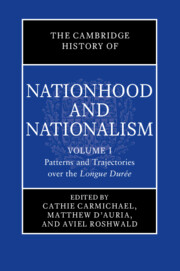Book contents
- The Cambridge History of Nationhood and Nationalism
- The Cambridge History of Nationhood and Nationalism
- The Cambridge History of Nationhood and Nationalism
- Copyright page
- Contents
- Figures
- Contributors
- General Introduction
- Part i The Politics of Ethnicity, Nationhood, and Belonging in the Settings of Classical Civilizations
- Part ii Paradigm Shifts and Turning Points in the Era of Globalization, 1500 to the Present
- 7 Colonial Expansion and the Making of Nations: The Spanish Case
- 8 The Reformation and National Identity
- 9 Europe’s Eighteenth Century and the Quest for the Nation’s Origins
- 10 Empire, War, and Racial Hierarchy in the Making of the Atlantic Revolutionary Nations
- 11 The Rise of the Charismatic Nation: Romantic and Risorgimento Nationalism, Europe, 1800–1914
- 12 Revolution and Independence in Spanish America
- 13 A Tale of Two Cities: The American Civil War
- 14 The Cycle of Inevitability in Imperial and Republican Identities in China
- 15 Colonial Subjects and the Struggle for Self-Determination, 1880–1918
- 16 The First World War
- 17 Anticolonialism and Nationalism in the French Empire
- 18 Patriotism in the Second World War: Comparative Perspectives on Countries under Axis Occupation
- 19 Decolonization and the Cold War
- 20 1968: The Death of Nationalism?
- Conclusion to Part II
- Index
- References
17 - Anticolonialism and Nationalism in the French Empire
from Part ii - Paradigm Shifts and Turning Points in the Era of Globalization, 1500 to the Present
Published online by Cambridge University Press: 27 October 2023
- The Cambridge History of Nationhood and Nationalism
- The Cambridge History of Nationhood and Nationalism
- The Cambridge History of Nationhood and Nationalism
- Copyright page
- Contents
- Figures
- Contributors
- General Introduction
- Part i The Politics of Ethnicity, Nationhood, and Belonging in the Settings of Classical Civilizations
- Part ii Paradigm Shifts and Turning Points in the Era of Globalization, 1500 to the Present
- 7 Colonial Expansion and the Making of Nations: The Spanish Case
- 8 The Reformation and National Identity
- 9 Europe’s Eighteenth Century and the Quest for the Nation’s Origins
- 10 Empire, War, and Racial Hierarchy in the Making of the Atlantic Revolutionary Nations
- 11 The Rise of the Charismatic Nation: Romantic and Risorgimento Nationalism, Europe, 1800–1914
- 12 Revolution and Independence in Spanish America
- 13 A Tale of Two Cities: The American Civil War
- 14 The Cycle of Inevitability in Imperial and Republican Identities in China
- 15 Colonial Subjects and the Struggle for Self-Determination, 1880–1918
- 16 The First World War
- 17 Anticolonialism and Nationalism in the French Empire
- 18 Patriotism in the Second World War: Comparative Perspectives on Countries under Axis Occupation
- 19 Decolonization and the Cold War
- 20 1968: The Death of Nationalism?
- Conclusion to Part II
- Index
- References
Summary
Over recent years the traditionally Eurocentric field of nationalism studies has changed, so as to include Asia, Africa, and Latin America. Although there have long been prominent exceptions to these regions’ previous neglect in studies of nationalism,1 such accounts have had a limited impact on the field’s theory building. This earlier marginality was all the more lamentable considering that these regions’ histories are central to the historical question of why and how the nation-state became something like a global gold standard of political organization during the past 250 years – and with reinvigorated speed in the two decades following the Second World War, during which many European colonies in Asia and Africa gained independent statehood.
- Type
- Chapter
- Information
- The Cambridge History of Nationhood and Nationalism , pp. 376 - 398Publisher: Cambridge University PressPrint publication year: 2023

